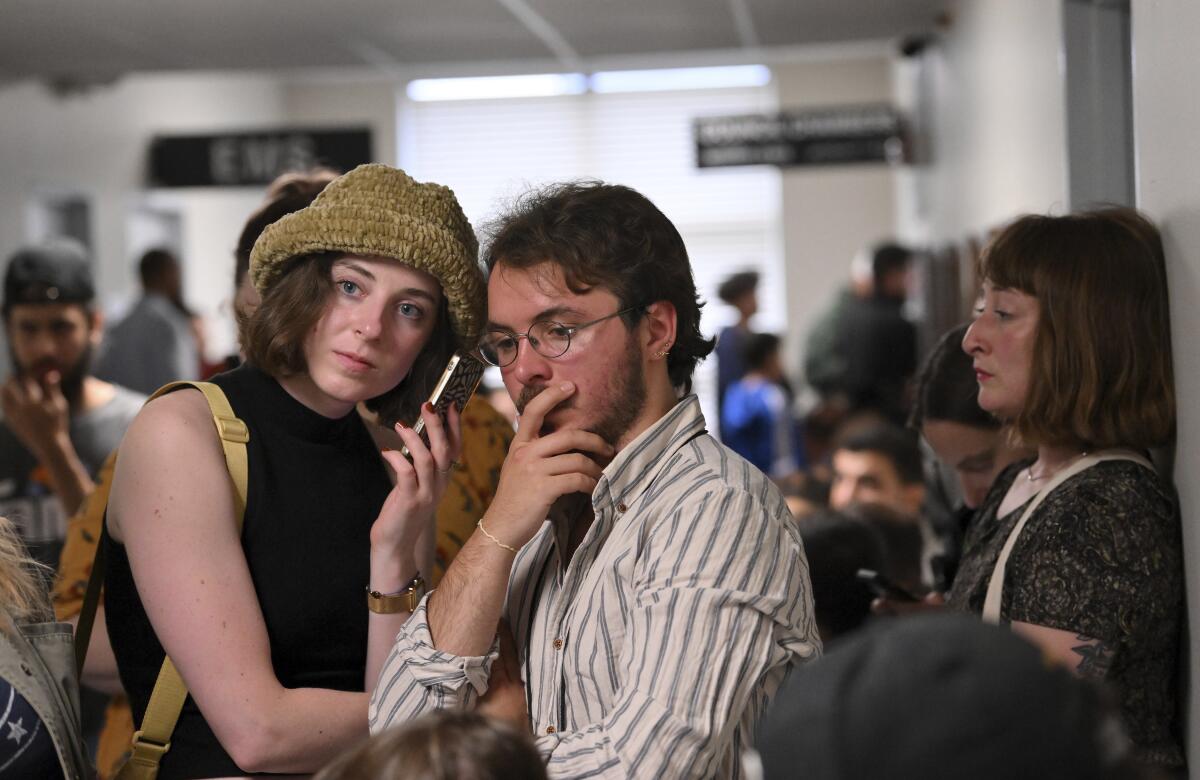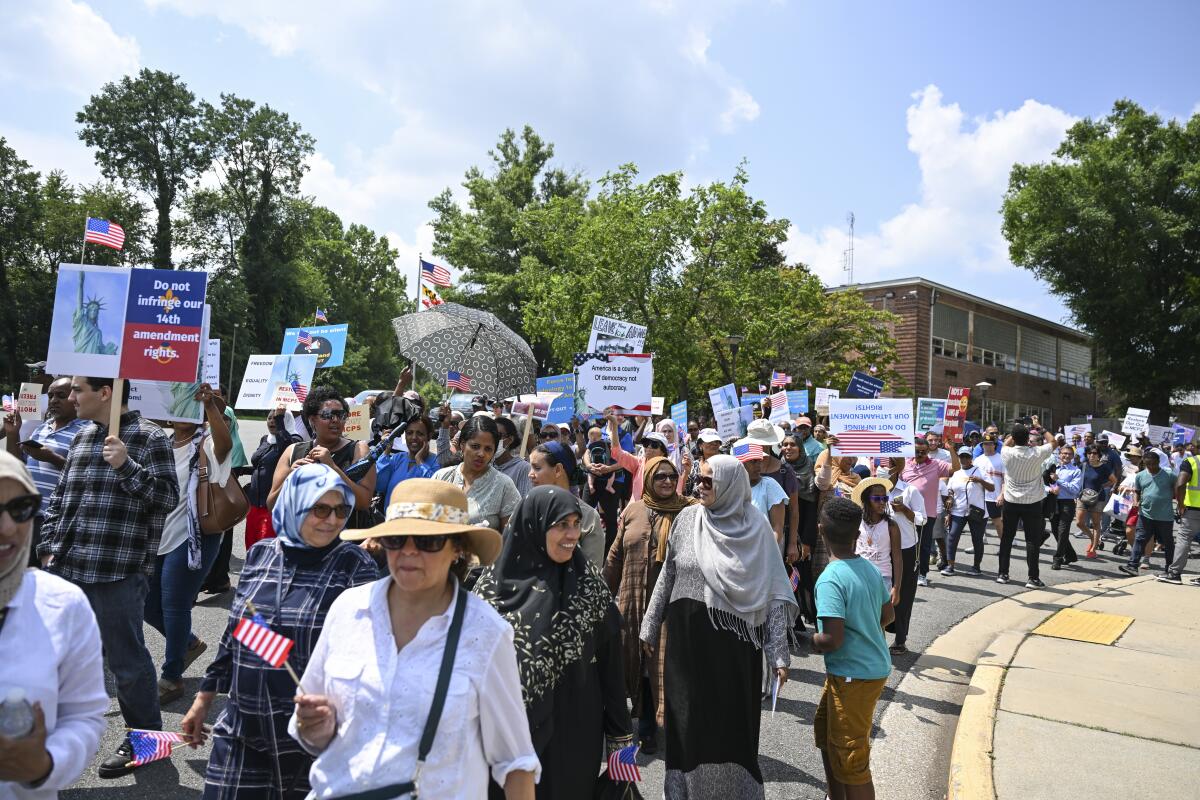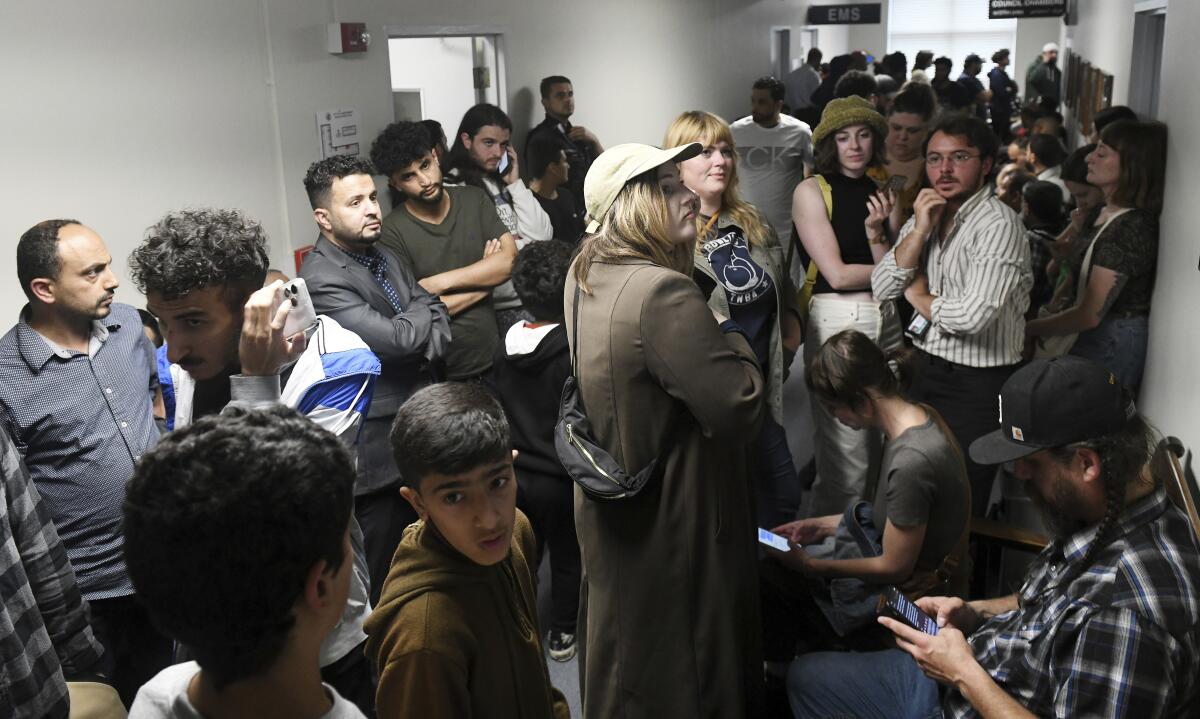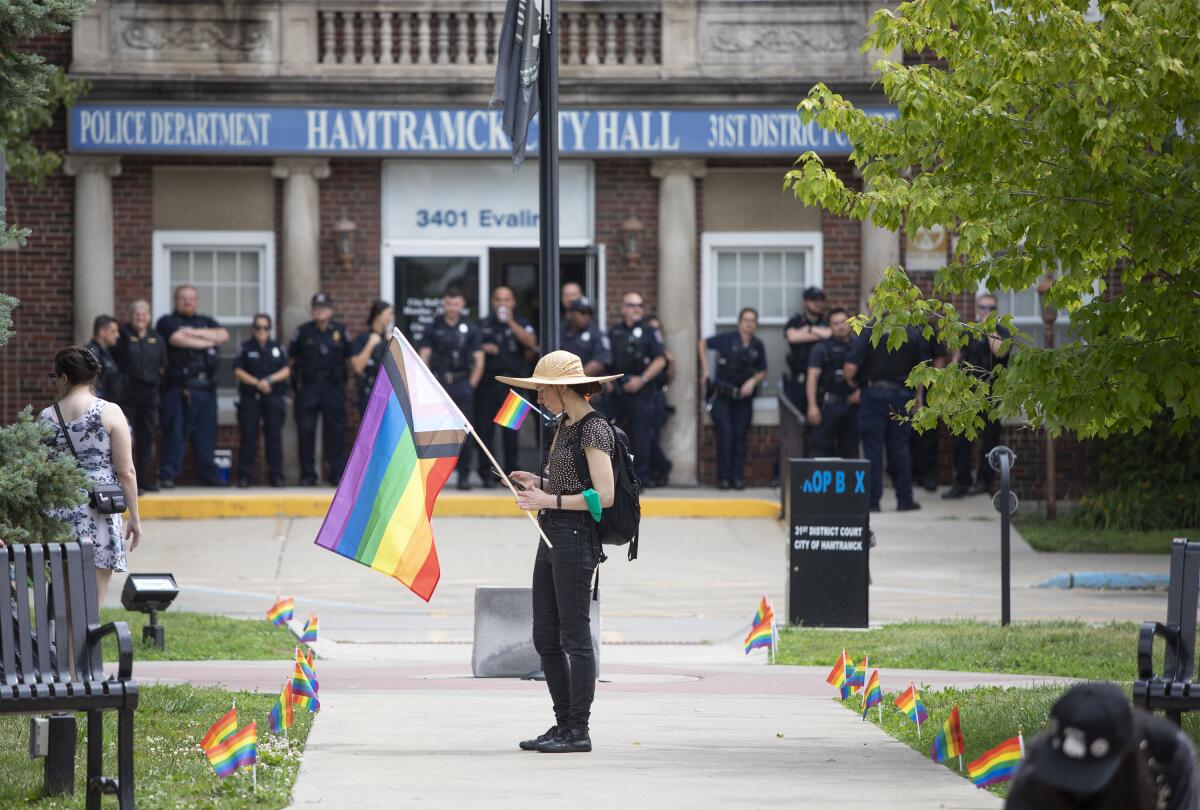For months, hundreds of religious parents have regularly rallied outside a Maryland school board building, aghast at curriculum featuring books that portray LGBTQ+ families to elementary school kids.
Waving American flags, they have chanted against “indoctrination” of children. They’ve sued to pull their kids from lessons and argued their case on Fox News.
In battles against LGBTQ+ acceptance, it is often white evangelicals pushing for book bans or boycotts over beer brands or bathing suits. In this case, Muslims are leading the fight.
The controversy in an overwhelmingly blue Washington, D.C., suburb highlights a shift. For decades, Muslims have been focused on fighting back against accusations of terrorism. But now, in clashes in left-leaning, diverse areas from the coasts to the heartland, they’re speaking out about what they see as intolerance of their faith.
“The school system believes it is being inclusive toward LGBTQ parents and students,” said Zainab Chaudry, the Maryland director of the Council on American-Islamic Relations, a national civil rights group that put out calls for rallies over the Maryland books controversy. “But in doing that, it is not being inclusive toward another set of parents and students.”
Chaudry said the conflict is just the tip of a movement “growing among Muslims in many parts of America.”
In the blue city of Hamtramck, Mich., an all-Muslim city council recently sided with Muslim activists and banned the LGBTQ+ Pride flag on city property. Muslim residents are pushing for the same in nearby Dearborn, where close to half of residents are Arab Americans and protesters derailed a school board meeting last fall over an LGBTQ+-related curriculum.

Hamtramck, Mich., residents Emelyn Rutowski and Alessandro Uribe-Rheinbolt listen to a June city council meeting that focused on the debate over the Pride flag.
(Robin Buckson / Associated Press)
And at dozens of American mosques in other cities, congregational prayer leaders have instructed followers to confront “gender ideology.”
It all bewilders some who say they supported Muslims when they were under attack from the far-right and now feel betrayed.
“When they wanted to broadcast their call to prayer from mosques, we defended them. When they were being hit with hate crimes, we stood by them, and we opened our arms when they were refugees,” said Russ Gordon, who was kicked off the Hamtramck Human Relations Commission this year after he defied the flag ban. “We live in America, but this feels like a theocracy.”
Muslims were once reliable allies in a coalition of racial, religious and sexual minorities courted by the left. The umbrella grew after the terrorist attacks of Sept. 11, 2001, and hit a stride during the Trump presidency as policies and pronouncements from the White House targeted each group with regularity.
Now, some of the 3.5-million followers of Islam in the U.S. are speaking out on topics where their conservative take on the faith more closely aligns with Republican politics.
“Muslims have long stayed out of these controversies,” said Youssef Chouhoud, a political science professor at Christopher Newport University in Virginia who studies the role of Muslims in politics. “But now, they are jumping in. It’s seen as less risky than it was before.”
Nationally, U.S. Muslims still have little political sway. Aside from a few areas where they’re concentrated, such as California, Michigan, Texas and New York, Muslims also have scant influence on state or local politics.
The community generally voted Republican through the 1990s, until 9/11 and what they saw as the party’s false conflation of Islam with extremist ideology spurred a move to the Democratic Party. Muslims are quick to remember that Donald Trump vowed in his first campaign to temporarily block Muslim arrivals to the U.S. and as president targeted Muslim-majority countries with travel bans.
A 2017 Pew Research Center survey found that 66% of Muslims favored the Democratic Party, compared with just 13% who leaned toward Republicans; 78% said they voted for Hillary Clinton for president. But in 2020, Associated Press exit polls found 35% of Muslims chose Trump and 64% President Biden.
Such divides mean little to parents in Montgomery County, Md., where many opposed to LGBTQ+ books are Democrats.
The fight centers on what the school district calls “inclusive texts” for elementary school language arts. They include “My Rainbow,” a story about a mom who makes a wig for her transgender daughter; “Uncle Bobby’s Wedding,” in which a girl learns her uncle will marry his boyfriend, and “Pride Puppy,” about a dog that gets lost in a colorful Pride parade. Parents especially objected to the puppy book because of a word-search list that includes “underwear,” “intersex” and “leather.”

Montgomery County, Md., parents protest outside of the county’s school board building in July.
(Anadolu Agency / Getty Images)
Some schools let parents opt out of the books earlier this year before administrators clarified the rules in the spring. They said state law allows parents to pull children from sex education, but these lessons fall outside that. The school board expected conservative Christians to be unhappy; it was caught off guard when hundreds of Muslim parents protested.
“Saying that a kindergartner can’t be present when you read a book about a rainbow unicorn because it offends your religious rights or your family values or your core beliefs is just telling that kid there is another reason to hate another person,” board member Lynne Harris said at one meeting.
“If you took any of these books and replaced the characters with straight characters, nobody would accusing anyone of sexualizing their kids or teaching them bad morality,” Harris later said in an interview. “What it comes down to, plainly, is homophobia.”
In another meeting, a member of the county council, Kristin Mink, accused Muslim parents of being on the “side of white supremacists.” She later apologized. Mink did not reply to interview requests.
Edward Mitchell, the national deputy director of CAIR, called the statements “inaccurate and offensive.” His group is supporting parents — Christian and Muslim — who are suing to pull their kids out of lessons using books that include LGBTQ+ characters or themes. CAIR is not party to the lawsuit, which was filed by Becket Law, a prominent Washington, D.C.-based firm that’s argued numerous “religious liberty” cases in front of the Supreme Court.
“If it so happens that there are people who we dislike that happen to be concerned about the same issues as us, so be it,” Mitchell said.
Moms for Liberty, a conservative organization that has successfully pushed for book bans at libraries and schools elsewhere in the U.S., is among the groups promoting the Maryland rallies. An emerging Islamic chapter of the Washington, D.C.-based Religious Freedom Institute has also filed court briefs in support of the parents. The organization has teamed with conservative Christians to promote state laws that allow medical professionals to deny abortion and gender-affirming care because they violate their religious beliefs. It has also pushed back on schools that ban teachers from outing transgender students to parents.
For Asma Uddin, a mother of two elementary school-age kids who attend Montgomery County schools, the issue has little to do with political party or anti-LGBTQ+ views. She just wants to decide when and what her kids learn about sexuality or gender identity.
“I’ve voted for Democrats my whole life,” said Uddin, a visiting assistant law professor at Catholic University who wrote “The Politics of Vulnerability: How to Heal Muslim-Christian Relations in a Post-Christian America.” “I voted for same-sex marriage,” she said in reference to a 2012 state referendum that included protections for conservative religious ministers. “I am left of center.”
Uddin, who spoke out at a recent rally in support of the lawsuit, formerly worked for Becket Law. “In my career, I’ve promoted working with people who agree with you on issues that you share regardless of political lines or stereotypes. It is unusual for me, though, to now be confronted with these questions with my family.”
Chaudry, the Maryland CAIR director, said she expected similar conflicts nationwide. “We have heard from Muslims in Vermont, Florida, Washington and Oregon where they are concerned about the same issues,” she said.
In heavily Democratic Dearborn, Mich., protests last year over LGBTQ+-themed books nearly shut down school board meetings. More recently, Muslim activists have tried unsuccessfully to get the Pride flag banned from city property.
“Pride is not a religion, it is not something everyone has to celebrate or respect,” said Hassan Aoun, a Muslim Uber driver in Dearborn. “I respect people who are gay. They can do what they want. It’s a free country. … But that doesn’t mean we have to put up a flag or shove it down people’s throats. It is clearly against Islam and we make up a lot of this community.”
Aoun, 42, said he usually voted for Democrats until gradually switching sides over the last decade over LGBTQ+ issues.
About 10 miles from Dearborn, liberals celebrated when Hamtramck elected the nation’s first majority-Muslim council in 2015. But in the three months since the council — now all-Muslim and all male — banned the Pride flag on public property, there have been protests and scathing online critiques. The ban, set forth during LGBTQ+ Pride Month, also made it illegal to fly other “religious, ethnic, racial, political or sexual orientation group flags.”
Mayor Amer Ghalib said the council was trying “to keep the city neutral.”
“It’s the only Muslim-majority city in the Western Hemisphere and people here care so much about their faith and family structure. We don’t discriminate against any group, but we don’t give special or preferential treatment to any group either,” he said.
He vowed to enforce the rule and complained about “aggressive people who act as a militia,” saying he fired two government employees who “disrespected law and order” after the vote.
They were members of the city’s Human Relations Commission who raised the flag in July on a city-owned flagpole, where it flew for two hours before workers removed it.
“Many religious people view homosexuality as a sin but that doesn’t make that a reality,” said Gordon, the former local Human Rights Commission chair who was one of those fired. “Many religious folks also accept gay people. It is a part of life, but these people who lead our city can’t face that.”
The controversy reignited this month during a local Labor Day parade when the mayor said he was offended that “pro-LGBT volunteers” placed him next to the Hamtramck Queer Alliance. He refused to walk in front of the group and instead rode in an SUV. The mayor accused event organizers of staging “optics to show us marching with the LGBT flags behind us.”
Tim Price, a member of the Hamtramck Queer Alliance, lamented the ongoing tensions.
“It is a bit crazy that all of this is coming back around again,” said Price, 59, who works in freelance marketing. “We accomplished marriage equality not long ago. And now we are having these conflicts all over. I am not surprised it’s because of religion. I was raised Catholic. A lot of people hide their dislike behind religion.”
However, while many traditional schools of Islam see LGBTQ+ identities as incompatible with the faith’s instructions, the views of American Muslims are more diverse.

An overflow crowd stands in Hamtramck, Mich., City Hall during a meeting on the municipality’s flag ordinance proposal.
(Robin Buckson / Associated Press)
A 2017 Pew Research Center survey found that more than half of American Muslims believed homosexuality should be accepted by society, close to double the support found a decade before. Acceptance was 60% among Muslim millennials. Pew found that Muslims were more likely to accept homosexuality than white evangelicals and Black Protestants, but less likely than mainline Protestants, Catholics and people with no religious affiliation. The survey was the last time the group asked Muslims about LGBTQ+ issues.
“What you also find is that they are also influenced by the same political trends and controversies affecting everyone else,” said Chouhoud, the professor.
A Muslim who lives outside Richmond, Va., Chouhoud said he’s noticed that LGBTQ issues have become a prominent subject at his mosque.
“This summer was the first that, for weeks on end, our Friday khutbah [sermon] was focused on LGBTQ+ questions,” said Chouhoud. “I have never seen that before.”
That was in part spurred by an open letter that hundreds of American imams signed, titled “Navigating Differences,” a rare coming together of the biggest names in American Islam in an attempt to course-correct followers.
“We refuse the false choice between succumbing to social pressures to adopt views contrary to our beliefs or facing unfounded charges of bigotry,” the 1,289-word essay said.
Yasir Qadhi, a widely followed Islamic scholar who serves at the East Plano Islamic Center in Texas, was a lead writer of the notice.
“We have as Muslims been relatively quiet on LGBTQ topics because we thought there were bigger fish to fry, so to speak,” said Qadhi. “But then the issue was coming directly to our communities and involving schools and children.”
Qadhi was also involved in another letter released by the same group in 2016, after a Muslim man who supported the Islamic State shot and killed 49 people the Pulse gay club in Orlando, Fla. That statement praised LGBTQ+ Americans for standing by Muslims who faced discrimination and encouraged Muslims to defend the humanity of LGBTQ+ people.
Now, some Islamic leaders express regret about supporting communities they see as being at odds with Islam. Sheikh Mustafa Umar, the senior religious director of the Islamic Center of Irvine, put it bluntly in recent remarks at the Chino Valley Islamic Center on the “LGBT lobby.”

A person holds an LGBTQ+ pride flag outside Hamtramck, Mich., City Hall as police stand near the door.
(Bill Pugliano / Getty Images)
“The Muslim leadership post-9/11 got so afraid, everyone got so scared, [saying:] ‘Our visas are going to be revoked, we’re going to get kicked out of the country, we’re going to have to move somewhere else…,” he said. “So people are like, ‘Let’s just team up just with anybody who is willing to talk to us.’ Not thinking about the long-term consequences. And when we look at that in retrospect, that was a huge mistake, and now it’s coming back to bite us.”
LGBTQ+ Muslims and progressive Muslim groups have responded forcefully to such perspectives.
“The Prophet Muhammad asked Muslims to stand up against oppression of the vulnerable,” said Ani Zonneveld, the Los Angeles-based founder of Muslims for Progressive Values, which organizes LGBTQ+-friendly worship groups across the U.S. “The prophet never punished a person for being gay, even though there were absolutely gay people existing during his life.”
Muslim scholars “keep on saying that being LGBTQ is morally wrong but then say they are not to blame for any hate or harm against LGBTQ people,” she said. “Nobody explicitly said to attack Muslim Americans after Sept. 11, but the political rhetoric around Islam led many people to commit hate crimes.”
In Maryland, the Muslim parents fighting against the book assignments say their goal is for both sides to get what they want. In late August, a federal judge denied their request for a temporary injunction to allow parents to opt kids out from readings, saying parents failed to show that the books would “result in the indoctrination of their children or otherwise coerce their children to violate or change their religious beliefs.”
“With or without an opt-out right, the parents remain free to pursue their sacred obligations to instruct their children in their faiths,” the judge said. “Even if their children’s exposure to religiously offensive ideas makes the parents’ efforts less likely to succeed, that does not amount to a government-imposed burden on their religious exercise.”
>>> Read full article>>>
Copyright for syndicated content belongs to the linked Source : LA Times – https://www.latimes.com/world-nation/story/2023-09-25/lgbtq-muslims-evangelical-republican-christians










